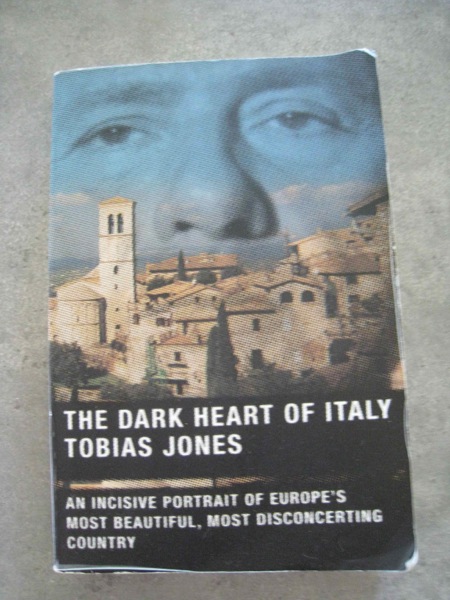Tobias Jones The Dark Heart of Italy

As a keen reader of Andrea Camilleri, Michael Dibdin and Donna Leon there has been more than one occasion (actually, at least one occasion per book, and there's a great wing of them) when I've paused to ponder whether the author is laying it on a bit thick when it comes to bribery, corruption, officious officials with dodgy connections and self serving politicians with ties to the Mafia and/or the Camorra.
Dibdin and Leon, after all, are expatriates. Dibdin’s four years teaching in Perugia would probably be enough to deliver a jaundiced view of the situation across the country, and while Donna Leon has lived in Venice for twenty years she's still probably seen as an outsider. At least that's the impression one gets from her writing. Andrea Camilleri, as a lifelong leftist would, I couldn't help suspect, be bringing his own ideological baggage with him. Then I tend to pause and think, no, maybe it's only a slight exaggeration. After all, Silvio Berlusconi is still Prime Minister,
Now, having read Tobias Jones' The Dark Heart of Italy: Travels Through Time and Space across Italy I'm not so sure about that. If anything I'm now inclined to believe that some of my favourite authors are, if anything understating things. Perhaps, if they went as far as they could go, we’d be inclined to dismiss those elements of the plot lines as grossly exaggerated.
Writing about Italy it's easy, if you're in the non-fiction realm, to concentrate on the obvious subject - the landscape, the architecture, the art, la cucina, the palazzi, the ritual and romance are obvious starting points - without digging too far below the surface and entering the labyrinthine realms that underlie and undermine the country's political, judicial and economic systems.
While Jones' book touches on some of those obvious subjects it's his excursions into the underlying and undermining factors that gives the book its bite.
Jones' moved to Italy in 1999 to be with his ragazza, and became intrigued by the language, the way things and situations were described, the people and their everyday activities, and while he took note of all the usual suspects he found, lurking below the surface, a national paranoia in a country torn apart by civil wars and endemic corruption.
The Dark Heart of Italy comprises a set of nine essays on different themes that work towards an understanding of why, in Italy, truth never seems to emerge from the entanglement of politics, corruption, assassinations and interminable legal wranglings.

